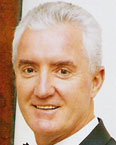Morality, success and leadership
20 July 2006
Moral intelligence plays a big part in corporate success. By Stephen Manallack*.
 Can you be ethical and successful? Definitely "yes", and just look for proof at Infosys, described in "Beyond Branding" by the Medinge Group as "one of the top 'brands with a conscience' in the world".
Can you be ethical and successful? Definitely "yes", and just look for proof at Infosys, described in "Beyond Branding" by the Medinge Group as "one of the top 'brands with a conscience' in the world".
My exposure to India's Infosys began in 2005 when its chairman and chief mentor N R Narayana Murthy, visited Australia and when speaking about corporate governance and morality in business he told the audience "We follow one principle – the softest pillow is a clear conscience". Later, he was quoted on this many times by senior government ministers and business leaders — such was the impact of his communication of ethics and leadership.
I cannot recall if at the same time he quoted Mahatma Gandhi who urged us to "be the change you want in the world" which is one of the great ethical exhortations of the modern era.
Yet for Infosys to have a reputation almost equally strong for its success as it is for its ethics, is quite an achievement in a short time. It was only a little over 25 years ago that Murthy and his co-founders sat around the kitchen table and set out their business dream. Infosys is a relative newcomer to the world of corporate success, starting in 1981 but experiencing its strongest growth in recent years. For example, revenue in 1994 was $9.5 million, which in 2004 had grown to $1 billion, and $2 billion the year after, a tribute to the 50,000 or so employees of the business.
Forbes says "Infosys is a model of transparency, not just for corporate India, but for companies everywhere…"
